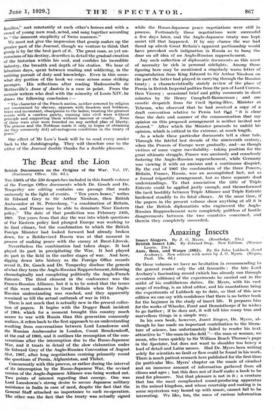The Bear and the Lion
British Documents on the Origins of the War. Vol. IV. (Stationery Office. 12s. 6d.).
THE 550th of the 550 despatches included in this fourth volume of the Foreign Office documents which Dr. Gooch and Dr. Temperley are editing contains one passage that reads ominously in the light of events. "Ten years hence," writes Sir Edward Grey to Sir Arthur Nicolson, then British Ambassador at St. Petersburg, "a combination of Britain, Russia, and France may be able to dominate Near Eastern policy." The date of that prediction was February 24th, 1908. Ten years from that day the war into which questions of Far Eastern policy had plunged Europe was working to its final climax, but the combination to which the British Foreign Minister had looked forward had already broken down, for a Bolshevized Russia was at that moment in process of making peace with the enemy at Brest-Litovsk.
Nevertheless the combination had taken shape. It had played its part in precipitating the War. It had played its part in the field in the earlier stages of war. And here, digging down into history as the Foreign Office records reveal it, Dr. Gooch and Dr. Temperley disclose the genesis of what they term the Anglo-Russian Rapprochement, following chronologically and completing politically the Anglo-French Entente. The third element in the coalescence was the Franco-Russian Alliance, but it is to be noted that the terms of this were unknown to Great Britain when the Anglo- Russian understanding was reached, and they apparently remained so till the actual outbreak of war in 1914.
There is not much that is actually new in the present collec- tion of papers. It begins with the Dogger Bank incident of 1904, which for a moment brought this country much nearer to war with Russia than this generation commonly realizes, it refers back to the first approach to an understanding resulting from conversations between Lord Lansdowne and the Russian Ambassador in London, Count Benckendorff, at the end of 1903, and it outlines the resumption of the con- versations after the interruption due to the Russo-Japanese War, and it treats in detail of the slow elaboration under Sir Edward Grey of the Anglo-Russian Convention of August 31st, 1907, after long negotiations centring primarily round the questions of Persia, Afghanistan, and Thibet.
Concurrently with this process, or rather during the interval of its interruption by the Russo-Japanese War, the revised version of the Anglo-Japanese Alliance was being worked out. Two points of interest regarding that emerge. One was Lord Lansdowne's strong desire to secure Japanese military assistance in India in case of need, despite the fact that the General Staff attached no importance to such co-operation. The other was the fact that the treaty was actually signed while the Russo-Japanese peace negotiations were still in process. Fortunately those negotiations were successful a few days later, and the Anglo-Japanese treaty was kept secret till that happened. If by any chance the war had flared up afresh Great Britain's apparent partisanship would have provoked such indignation in Russia as to bang the door on all idea of an Anglo-Russian rapprochement.
Any such collection of diplomatic documents as this must of necessity be rich in personal sidelights. Among those figuring here may be mentioned a singularly warm letter of congratulation from King Edward to Sir Arthur Nicolson on the part the latter had played in carrying through the Russian treaty ; a characteristically stately review of the place of Persia in British Imperial politics from the pen of Lord Curzon, then Viceroy ; occasional brief and pithy comments in short minutes by Sir Henry Campbell-Bannerman ; and one caustic despatch from Sir Cecil Spring-Rice, Minister at Teheran, who observed that he had received a copy of a draft convention relative to Persia but that "it is clear from the date and manner of the communication that my opinion on this proposed arrangement is neither invited nor desired." After which the Minister proceeds to unfold his opinion, which is critical in the extreme, at much length.
As a whole these particular documents tell a clear tale. Through the fateful last decade of the nineteenth century, when the Powers of Europe were gradually, and—as though victims of some vague inevitability—taking position for the great ultimate struggle, France was anxiously and ceaselessly fostering the Anglo-Russian rapprochement, while Germany was viewing it with an anxious and a continuous disquiet. By the end of 1907 the combination of the three Powers, Britain, France, Russia, was an accomplished fact, not as a formal tripartite arrangement, but as three separate dual understandings. To that association the title of Triple Entente could be applied justly enough, and thenceforward the tacit hostility between Triple Alliance and Triple Entente hardened steadily to its fatal climax. At the same time, if the papers in the present volume show anything at all it is that the British diplomatists who engineered the Anglo- Russian Rapprochement were completely guiltless of hostile disagreements between the two countries concerned, and therein they completely succeeded.










































 Previous page
Previous page